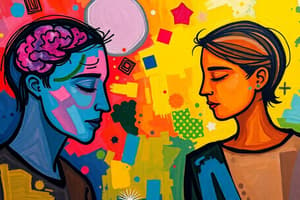Podcast
Questions and Answers
¿Qué habilidad social implica expresar sentimientos, pensamientos y opiniones de manera respetuosa hacia los demás y uno mismo?
¿Qué habilidad social implica expresar sentimientos, pensamientos y opiniones de manera respetuosa hacia los demás y uno mismo?
- Escucha activa
- Empatía
- Comunicación efectiva
- Asertividad (correct)
¿Qué distorsión cognitiva implica ver las cosas en blanco y negro, sin matices?
¿Qué distorsión cognitiva implica ver las cosas en blanco y negro, sin matices?
- Razonamiento emocional
- Pensamiento de todo o nada (correct)
- Etiquetado
- Lectura mental
¿Cuál es el efecto de desarrollar habilidades de comunicación efectiva, empatía y asertividad en las relaciones interpersonales?
¿Cuál es el efecto de desarrollar habilidades de comunicación efectiva, empatía y asertividad en las relaciones interpersonales?
- Generar malentendidos
- Fomentar patrones de pensamiento negativo
- Mejorar las relaciones, resolver conflictos y aumentar el bienestar general (correct)
- Disminuir la autoestima
¿Cuál es una característica de la distorsión cognitiva conocida como lectura mental?
¿Cuál es una característica de la distorsión cognitiva conocida como lectura mental?
¿Qué consecuencia puede tener un bajo nivel de habilidades sociales y altos niveles de distorsiones cognitivas en las relaciones y la salud mental?
¿Qué consecuencia puede tener un bajo nivel de habilidades sociales y altos niveles de distorsiones cognitivas en las relaciones y la salud mental?
¿Por qué es importante reconocer y desafiar las distorsiones cognitivas según el texto?
¿Por qué es importante reconocer y desafiar las distorsiones cognitivas según el texto?
¿Qué habilidades son necesarias para una comunicación efectiva según el texto?
¿Qué habilidades son necesarias para una comunicación efectiva según el texto?
¿Qué implica la empatía según el artículo?
¿Qué implica la empatía según el artículo?
¿Por qué es importante la empatía en las interacciones sociales?
¿Por qué es importante la empatía en las interacciones sociales?
¿Cuál es la función principal de las habilidades de comunicación según el texto?
¿Cuál es la función principal de las habilidades de comunicación según el texto?
¿Cuál es uno de los aspectos que permiten las habilidades de comunicación según el artículo?
¿Cuál es uno de los aspectos que permiten las habilidades de comunicación según el artículo?
¿Qué papel desempeña la empatía en la resolución de conflictos según el texto?
¿Qué papel desempeña la empatía en la resolución de conflictos según el texto?
Flashcards are hidden until you start studying
Study Notes
Social skills and cognitive distortions play essential roles in shaping our interactions with others, influencing our relationships, personal growth, mental health, and success in various aspects of life. This article will explore these concepts, focusing on communication skills, empathy, and assertiveness as subtopics.
Social Skills
Social skills are the abilities and behaviors necessary for effective communication and interaction with other people. They include verbal communication, nonverbal communication, problem-solving, and conflict resolution. These skills enable us to build and maintain positive relationships, navigate social situations, and successfully navigate work, school, and personal life.
Communication Skills
Communication skills are the core of social skills. Effective communication involves both speaking and listening. Speaking skills include expressing thoughts and ideas clearly, while listening skills involve understanding and responding appropriately to what others are saying. Good communication skills can lead to better relationships, improved problem-solving, and increased understanding between individuals.
Empathy
Empathy is a social skill that involves understanding and sharing the feelings of others. It is an essential component of social interactions and helps foster positive relationships. Empathy allows us to connect with others, providing a foundation for effective communication, conflict resolution, and emotional intelligence.
Assertiveness
Assertiveness is another crucial social skill. It involves expressing feelings, thoughts, and opinions in a way that respects others and is respectful of oneself. Assertiveness can help individuals feel more confident, establish better boundaries, and improve interpersonal relationships.
Cognitive Distortions
Cognitive distortions are irrational thought patterns that can negatively impact our mental health, relationships, and decision-making. They often stem from cognitive biases, which are systematic errors in how we perceive, process, and interpret information. Understanding cognitive distortions and learning to recognize and challenge them can help individuals improve their mental health and social interactions.
Common Cognitive Distortions
Some common cognitive distortions include:
- All-or-nothing thinking: Seeing things in black-and-white, without any shades of grey.
- Mind reading: Assuming you know what others are thinking without evidence.
- Emotional reasoning: Believing your feelings reflect the way things really are.
- Labeling: Assigning global negative labels to yourself or others.
- Mental filter: Focusing on the most negative aspects of a situation.
Impact of Social Skills and Cognitive Distortions on Relationships and Mental Health
Improving social skills and reducing cognitive distortions can lead to better relationships, increased self-esteem, and improved mental health. By developing effective communication skills, empathy, and assertiveness, individuals can foster positive relationships, resolve conflicts, and enhance their overall well-being. On the other hand, poor social skills and high levels of cognitive distortions can lead to misunderstandings, negative thinking patterns, and unhealthy relationship dynamics.
In conclusion, understanding social skills and cognitive distortions is crucial for building strong relationships, navigating complex social situations, and maintaining good mental health. By developing effective communication skills, empathy, and assertiveness while recognizing and challenging cognitive distortions, individuals can improve their interpersonal interactions and overall well-being.
Studying That Suits You
Use AI to generate personalized quizzes and flashcards to suit your learning preferences.




